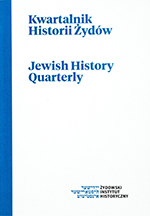Księga rachunkowa kazimierskiego cechu złotników żydowskich (1834-1859)
The Book of Accounts of the Kazimierz Guild of Jewish Goldsmiths (1834-1859)
Author(s): Monika PaśSubject(s): History
Published by: Żydowski Instytut Historyczny
Keywords: Kraków; Kazimierz (district of Kraków); goldsmithery; guilds of Jewish craftsmen
Summary/Abstract: Among the scarce documents referring to Jewish craftsmen in Kazimierz and Kraków in the 19th century, special attention is due to the book of accounts of the guild of Jewish goldsmiths, used between 21 October 1834 and 19 December 1859 (the dates of the first and the last entry respectively). The book, kept in Polish, was held by the association for 25 years, before becoming the property of antique book dealer Jakub Pos (Poss), from whom it was purchased by Professor Józef Łepkowski, who next sold it to Konstanty Przezdziecki, who in turn gave it in 1894 to the Old Records Archives of the city of Kraków (now the National Archives in Kraków), where it remains to this day. The starting of the book was connected with the 1833 establishment of a separate Jewish goldsmiths’ guild in Kraków, a consequence of the disputes going on since 1820 between the Kraków city authorities and the attitude of the local Catholic goldsmiths, who did not want to have Jews in their organization; the circumstances in which the Jewish guild ultimately got rid of their book for the benefit of Jakub Pos (Poss), are not known, however.This book of accounts is currently the only direct source of information about the history of the Jewish goldsmiths milieu during the times of the Free City of Kraków and in the first decade after the town’s reincorporation into Austria; it is also a fundamental prosopographic document concerning Jewish goldsmiths, a company of almost 20 master craftsmen around 1834, who were joined in 1841 by tinsmiths, which was reflected in the new name of the association. The book makes it possible to determine the exact number of members of the organization at any moment, the names of the master craftsmen, the dates of their induction into the guild, the mandatory fees that had to be paid by the masters and apprentices, and also the expenditures on charities, organizational expenses and the really infrequent religious contributions.
Journal: Kwartalnik Historii Żydów
- Issue Year: 267/2018
- Issue No: 03
- Page Range: 679-688
- Page Count: 10
- Language: Polish
- Content File-PDF

